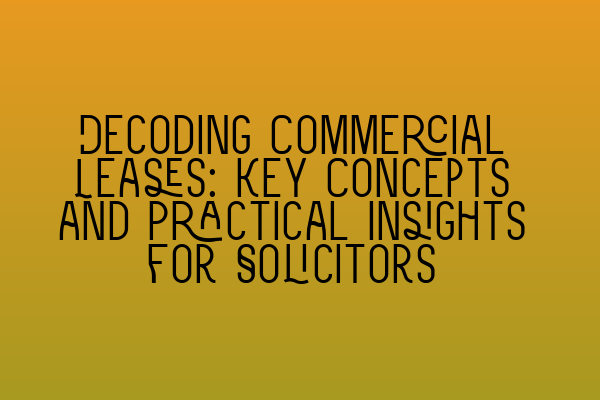Decoding Commercial Leases: Key Concepts and Practical Insights for Solicitors
Commercial leases play a critical role in the world of property law. As a solicitor specializing in property law, it is crucial to have a thorough understanding of the key concepts and practical insights related to commercial leases. This knowledge will empower you to provide expert advice and guidance to your clients while ensuring their interests are protected.
1. Understanding the Basics
Before delving into the complexities of commercial leases, it is essential to familiarize yourself with the basic elements. A commercial lease is a legally binding contract between a landlord and a tenant for the rental of a commercial property. It outlines the rights, obligations, and responsibilities of both parties during the lease term.
When examining a commercial lease, you must pay attention to several crucial provisions:
- Rent: The lease must specify the amount of rent and the frequency of payment. It’s important to understand any provisions related to rent escalation or rent reviews.
- Term: The lease term refers to the duration for which the lease is agreed upon. Be aware of any break clauses or renewal options available to either party.
- Repairs and Maintenance: Clauses related to repairs and maintenance outline the obligations of the landlord and tenant when it comes to the upkeep of the property.
- Use: The permitted use of the property must be clearly defined within the lease. Be vigilant about any restrictions or conditions that may impact the tenant’s business activities.
- Insurance: Commercial leases typically require the tenant to maintain suitable insurance coverage. Familiarize yourself with the insurance requirements and any additional obligations related to insurance claims.
2. Negotiating Key Terms
As a solicitor, you may find yourself in the position of negotiating the terms of a commercial lease on behalf of your client. This requires thorough preparation, strategy, and a keen eye for detail.
When negotiating key terms, consider the following:
- Rent Review: Understand the different methods of rent review and their implications for your client. Advise them on the most favorable option based on their circumstances.
- Break Clauses: Assess the potential advantages and disadvantages of including break clauses for both the landlord and the tenant. Carefully review the conditions that trigger a break clause to avoid any unintended consequences.
- Repair Obligations: Scrutinize the repair obligations outlined in the lease and consider negotiating for more favorable terms, especially if the property requires significant maintenance or repairs.
- Rental Deposit: Discuss the possibility of negotiating the amount and terms of the rental deposit. This can provide your client with financial security and peace of mind.
Remember, the negotiation process requires effective communication and a willingness to find mutually beneficial solutions. Through careful negotiation, you can help your client secure a lease that aligns with their business needs and protects their interests.
3. Due Diligence and Legal Considerations
Before finalizing a commercial lease, it is crucial to conduct thorough due diligence and address any legal considerations. This ensures that your client is fully aware of their obligations and potential risks.
Some essential due diligence steps include:
- Title and Planning: Verify the landlord’s ownership of the property and check for any planning restrictions or conditions that may impact your client’s intended use.
- Survey and Valuation: Recommend a professional survey and valuation to assess the condition and market value of the property.
- Financial Considerations: Advise your client to conduct a financial assessment, taking into account rent affordability and potential future liabilities.
- Legal Compliance: Ensure that the lease complies with all relevant legislation, including anti-money laundering regulations and the Landlord and Tenant Act 1954.
By conducting due diligence and addressing legal considerations, you can protect your client from potential disputes and unfavorable outcomes.
4. Leases and the Digital Age
The digital era has brought about significant changes in the way commercial leases are drafted and managed. As a solicitor, it is crucial to adapt to these changes and utilize technology effectively.
Some key aspects of leases in the digital age include:
- Electronic Signatures: Familiarize yourself with the legality and practicality of using electronic signatures to execute commercial leases.
- Online Document Management: Embrace cloud-based document management systems to streamline lease administration and facilitate collaboration with clients.
- Data Protection: Ensure that personal data collected during the lease process is handled in compliance with the General Data Protection Regulation (GDPR).
By staying updated on digital advancements and incorporating technology into your practice, you can enhance efficiency and provide a seamless experience for your clients.
Conclusion
Decoding commercial leases requires a comprehensive understanding of key concepts, effective negotiation skills, thorough due diligence, and adaptation to the digital age. By honing your expertise in these areas, you will be well-equipped to provide exceptional service to your clients and navigate the complex world of commercial leases.
If you have any questions or need assistance with commercial lease matters, feel free to reach out to our team at SQE Property Law & Land Law. We offer expert advice and guidance tailored to your specific needs.
Related Articles:
